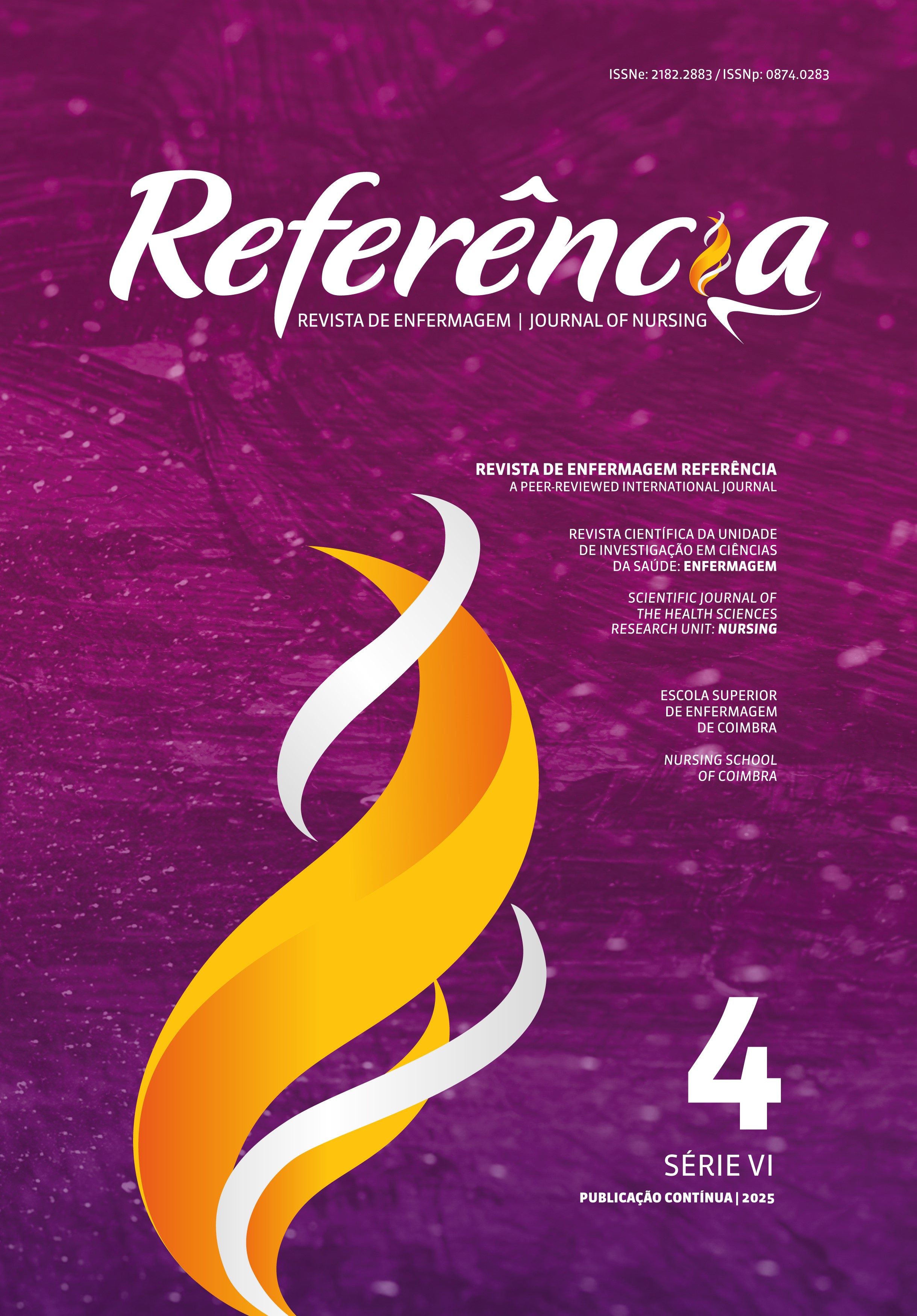Promoção de Relações de Intimidade Saudáveis: Efetividade do Programa Desenvolvido com Adolescentes
DOI:
https://doi.org/10.12707/RVI24.83.36996Palavras-chave:
adolescente, programa de intervenção, enfermagem, relações interpessoais, avaliação de programaResumo
Enquadramento: A adolescência é um período crucial para a intensificação das relações sociais e o início das primeiras relações de namoro. Período estratégico para a implementação de programas de promoção de relações intimidade saudáveis e prevenção da violência.
Objetivo: Avaliar a efetividade do programa promoção de relações de intimidade saudáveis (PRIS), em estudantes do 3º ciclo do ensino básico.
Metodologia: Estudo pré-experimental com grupo único, com avaliações pré e pós-intervenção, follow-up após 6 meses. Participaram 109 estudantes do 9.º ano, utilizando-se os questionários Conhecimento da Violência nas Relações de Intimidade (CVRI) e Deteção de Sexismo em Adolescentes (DSA).
Resultados: O nível de conhecimentos dos adolescentes sobre violência nas relações de namoro aumentou e manteve-se elevado no follow-up. As adolescentes apresentaram níveis mais elevados, com diferença estatisticamente significativa (p < 0,001). Os valores médios do DSA diminuíram para ambos os sexos após o programa e 6 meses após.
Conclusão: A evolução dos conhecimentos VRI e a diminuição das crenças sexistas dos adolescentes indicam que intervenções educativas participativas promovem relacionamentos íntimos saudáveis
Downloads
Referências
Barreto, M., & Ellemers, N. (2013). Sexism in contemporary societies: How it is expressed, perceived, confirmed, and resisted. In M. Ryan & N. Branscombe (Eds.), The SAGE handbook of gender and psychology (pp. 289–305). SAGE Publications. https://doi.org/10.4135/9781446269930.n1
David-Ferdon, C., Vivolo-Kantor, A., Dahlberg, L., Marshall, K., Rainford, N., & Hall, J. (2016). A comprehensive technical package for the prevention of youth violence and associated risk behaviors. National Center for Injury Prevention and Control; Centers for Disease Control and Prevention.
Dovidio, J., Hewstone, M., Glick, P., & Esses, V. (2010). The SAGE handbook of prejudice, stereotyping and discrimination. SAGE Publications. https://doi.org/10.4135/9781446200919
Fernandes, M., Moreira, I., Silva, A., Sá, M., Veríssimo, C., & Leitão, M. (2020). Escala de detección de sexismo en adolescentes: Tradução e validação para o contexto português. Revista de Enfermagem Referência, 5(1), e19075. https://doi.org/10.12707/RIV19075
Gil Bermejo, J., Martos Sánchez, C., Vásquez Aguado, O., & García-Navarro, E. (2021). Adolescents, ambivalent sexism and social networks, a conditioning factor in the healthcare of women. Healthcare, 9(6), 721. https://doi.org.10.3390/healthcare9060721
Hielscher, E., Moores, C., Blenkin, M., Jadambaa, A., & Scott, J. G. (2021). Intervention programs designed to promote healthy romantic relationships in youth: A systematic review. Journal of Adolescence, 92(1), 194-236. https://doi.org/10.1016/j.adolescence.2021.08.008
Jardim, J., & Pereira, A. (2006). Competências pessoais e sociais: Guia prático para a mudança positiva. Edições ASA. Leitão, M., Fernandes, M., Fabião, J., Alegre Sá, M., Veríssimo, C., & Dixe, M. (2013). Prevenir a violência no namoro: N(amor)o (im)perfeito: Fazer diferente para fazer a diferença. Unidade de Investigação em Ciências da Saúde: Enfermagem; Escola Superior de Enfermagem de Coimbra. https://rr.esenfc.pt/rr/index.php?module=rr&target=publicationDetails&pesquisa=&id_artigo=2399&id_revista=19&id_edicao=56
Lundgren, R., & Amin, A. (2015). Addressing intimate partner violence and sexual violence among adolescents: Emerging evidence of effectiveness. Journal of Adolescent Health, 56(1), S42-S50. http://dx.doi.org/10.1016/j.jadohealth.2014.08.012
Malta, D., Machado, I., Felisbino-Mendes, M., Prado, R., Pinto, A., Oliveira-Campos, M., Souza, M., & Assunção, A. (2018). Uso de substâncias psicoativas em adolescentes brasileiros e fatores associados: Pesquisa nacional de saúde dos escolares, 2015. Revista Brasileira de Epidemiologia, 21(sup.1), e180004. https://doi.org.10.1590/1980-549720180004.supl.1
Moreira, I., Fernandes, I., Silva, A., Veríssimo, C., Leitão, M., Filipe, L., & Sá. M. (2021). Intimate relationships as perceived by adolescents: Concepts and meanings. International Journal of Environmental Research and Public Health, 18(5), 2256. https://doi.org/10.3390/ijerph18052256
Neves, S., Ieracitano, F., Topa, J., Silva, E., Blanes, M., Costa, D., Mocanu, V., Gotcã, I., & Vives-Cases, C. (2023). Using cinema voice to promote positive intimate relationships among European youth: The Lights4Violence project. Children & Society, 37(2), 634–653. https://doi.org/10.1111/chso.12621
Pérez-Martínez, V., Marcos-Marcos, J., Cerdán-Torregrosa, A., Briones-Vozmediano, E., Sanz-Barbero, B., Davó-Blanes, M., Daoud, N., Edwards, C., Salazar, M., Parra-Casado, D., & Vives-Cases, C. (2023). Positive masculinities and gender-based violence educational interventions among young people: A systematic review. Trauma Violence Abuse, 24(2), 468-486. https://doi.org.10.1177/15248380211030242
Ramiro-Sánchez, T., Ramiro, M., Bermúdez, M., & Buela-Casal, G. (2018). Sexism and sexual risk behavior in adolescents: Gender diferences. International Journal of Clinical and Health Psychology, 18(3), 245-253. https://doi.org/10.1016/j.ijchp.2018.04.002
Rosales-Villacrés, M., Oyanadel, C., Changotasig-Loja, D., & Peñate-Castro, W. (2021). Effects of a mindfulness and acceptance-based program on intimate relationships in a youth sample: A randomized controlled trial. Behavioral. Sciences, 11(6), 84. https://doi.org/10.3390/bs11060084
SanzBarbero, B., Ayala, A., Ieracitano, F., RodríguezBlázquez, C., Bowes, N., De Claire, K., Mocanu, V., AntonPaduraru, D., SánchezSanSegundo, M., AlbaladejoBlázquez, N., Neves, A., Queirós, A., Jankowiak, B., Waszynska, K., & VivesCases (2022). Effect of the Lights4Violence intervention on the sexism of adolescents in European countries. BMC Public Health, 22, 547. https://doi.org/10.1186/s12889-022-12925-3
Stanley, S., Carlson, R., Rhoades, G., Markman, H., Ritchie, L., & Hawkins, A. (2020). Best practices in relationship education focused on intimate relationships. Family Relations, 69(3), 497-519. https://onlinelibrary.wiley.com/doi/full/10.1111/fare.12419
Swim, J., & Hyers, L. (2009). Sexism. In T. Nelson (Ed.), Hand book of prejudice, stereotyping, and discrimination (pp. 407-430). Psychology Press.
Valdivia-Salas, S., Lombas, A. S., Jiménez, T. I., Lucas-Alba, A., & Villanueva-Blasco, V. J. (2023). Profiles and risk factors for teen dating violence in Spain. Journal of Interpersonal Violence, 38(3- 4), 4267-4292. https://doi.org/10.1177/08862605221114305A2024-06-13 11:45
Vives-Cases, C., Davo-Blanes, M., Ferrer-Cascales, R., Sanz-Barbero, B., Albaladejo-Blázquez, N., Sánchez-San, M., Lillo-Crespo, M., Bowes, N., Neves, S., Mocanu, V., Carausu, E., Pyzalski, J., Forjaz, M., Chmura-Rutkowska, I., Vieira, C., & Corradi, C. (2019). Lights4Violence: A quasi-experimental educational intervention in six European countries to promote positive relationships among adolescentes. BMC Public Health, 19(1), 389. https://doi.org.10.1186/s12889-019-6726-0
Vivolo-Kantor, A., Niolon, P., Estefan, L., Le, V., Tracy, A., Latzman, N., Little, T., Lang, K., DeGue, S., & Tharp, A. (2021). Middle school effects of the dating matters® comprehensive teen dating violence prevention model on physical violence, bullying,and cyberbullying: A cluster-randomized controlled trial. Prevention Science, 22, 151–161. https://doi.org/10.1007/s11121-019-01071-9
World Health Organization. (2013). Global and regional estimates of violence against women: Prevalence and health effects of intimate partner violence and non-partner sexual violence. https://apps.who.int/iris/handle/10665/85239

















